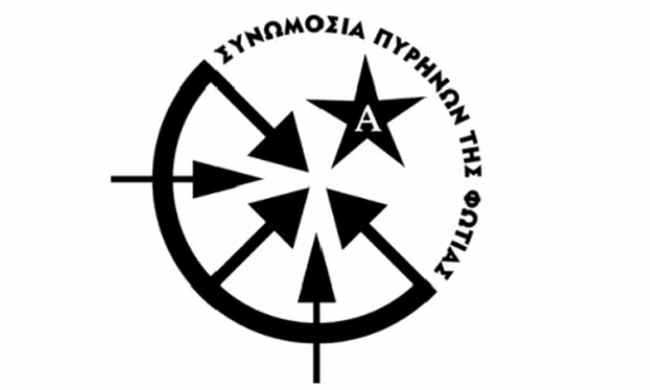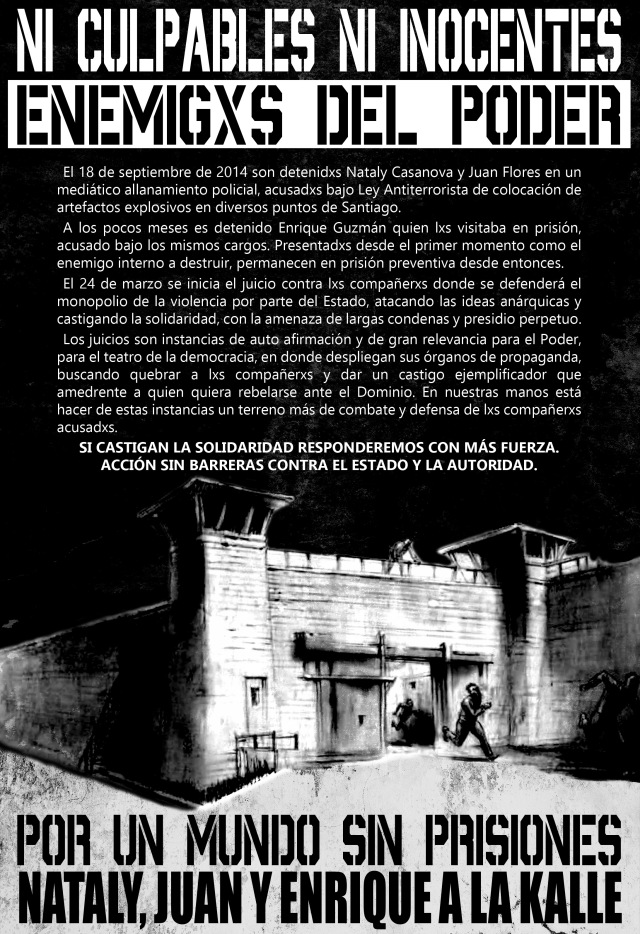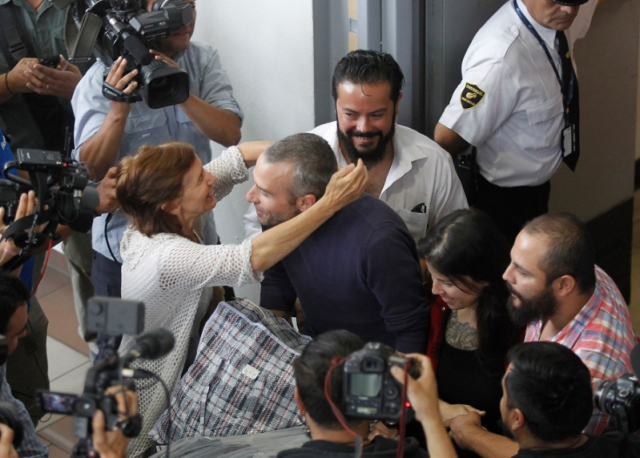
(Received 12/11/17)
Insurrection Cannot Be Negotiated
Time is the illness of reality. In prison, time seems to poison the atmosphere. The air thickens as though it is flooded with lead filings and each and every day our lungs are infested with this oxygen so toxic that it weighs on us again and again, more so with each passing day.
You feel so burdened that at some point you begin to think that every step you take, removes a day from your life; each step and a day less, each step and a day less…
During these almost 6 years and a half of my imprisonment, I always felt like I was killing so many days while moving endlessly back and forth in courtrooms. I have seen the despicable ritual of trials taking place in the name of Democracy too many times repeatedly and every single time I walked away with packs of decades of sentences on my back.
However, it is not only the harsh sentences imposed on me by all this bureaucratic barbarity which has been grinding lives in the millstone of justice that bothers me the most, but also the arrogant and self-righteous style of the judges that execute our freedom while maintaining the illusion of representing something special.
We now, therefore, are in the process of a new round of trials, where the judicial decisions of the proceedings at first instance are being reviewed on whether they were correct or not. Personally, I didn’t attend this process to beg for mitigating or commutation. I did it to confront the propaganda of authority, a propaganda that is trying to legitimize morally and politically our convictions. For sovereignty, it is quite important and wise not only to eliminate its enemies by holding them hostage for years but also to deconstruct their personalities so that their motives and their actions appear selfish, dark, dirty and anything other than actions that aim at the very core of sovereignty: power.
For Democracy, we are just some common law criminals. Although they call us terrorists, vote for special laws for our prosecution, create special troops in order to pursue us, although we are tried in special courts by special judges selected specifically for these occasions, although they keep us, occasionally, captives in special solitary confinement or make sure to impose on us every possible or improbable scenario of exemption to several acquired rights of the prisoners, they above all consider us common law criminals. At this point we are seeing the following exceptionally uncommon. Even though our actions theoretically fall under the common criminal offence, the entire political system feels the need to condemn it politically on a continuous basis with expressions of outrage. The same goes for a whole mob of journalists, academics of all kinds, figures of the left-progressive artistic stage and generally various high profile and acknowledged personalities of society.
All of them tend to affirm repeatedly how very detestable the culture of violence is and how “Democracy has no deadlocks”. There has never been such a fuss, of course, about any other common law offences and we will surely not see any surprises in the future.
Still, at these judicial proceedings, prosecutors often feel the need to add some political positions to their, usually, rambling discourses, apart from all the legal statements.
Frequently, in courtrooms of that kind we have heard prosecutors rushing to comment politically on what terrorism means, what political crime means and for which reasons, in Democracy, protesting must have limits.
More royal than the king, prosecutors present themselves with the Royal Purple clothing of Democracy preaching its moral, political and cultural superiority, only to conclude finally in the classical ancient well known verdict that there is no greater evil than anarchy.
They may not repeat, of course, the words that Sophocles put in Creon’s mouth in his famous work “Antigone”, but the meaning always remains the same. Prosecutors with their judgements, representing authority’s universe of values, do not content themselves with the adoption of the usual convictions but also seek to crush the practical opposition to Democracy’s authority and the violent contest of its laws and institutions. So these special courts officially refuse to admit that in reality we are prisoners of war, while at the same time are anxiously striving to defend Democracy’s “highest” values, as the latest bulwarks of system’s moral legality. And that, if anything, could only constitute even an indirect admission that these trials are in reality trials of values.
In the real world, the material world, perceivable through our senses, the ideas that are lacking of related actions are hollow, empty, deprived of substance and meaning. If today I am a hostage of authority tried again and again, either at first or second instance, it is because I have let the idea of anarchy find its way inside me and have chosen to live fighting in various ways against authority.
In love with the value of absolute freedom, believing strongly deep down that any kind of power – even if presented under different guises each time – is nothing but a noose around the neck of people that tightens and strangles their freedom, I have hated laws, rules and the morality of your world.
I disdained every authority, loathed any sense of discipline and loved the idea of rebellion as a continuous practical opposition to power. Being charmed by the beauty of absolute freedom as a value was not just a caprice of my adolescence, neither a juvenile paroxysm created by some easy adrenaline-based excitement and it certainly wasn’t a result of some random passage along the corridors of a library of anarchist writers.
At a time when social protest and any social struggles were considered at best old-fashioned, dated, a remnant of an old graphic era that had to be placed in an honorary mausoleum or an enhancement field for unionism advocates of the rights (both of workers and students) who brought any political clientele and a despicable cheap politicking together, the only social dynamic that stood up in combative terms was the world of anarchy and the wider anti-authoritarianism. I made the decision to become part of this dynamic, however the social conditions of this era have greatly shaped my general worldview as well.
In the mid-2000s, when I began to take part in the various events of the anarchist movement, the socially shaped reality radiated an absolute gloom. The political hegemony of the system had actually built two strong pillars on society:
I) On the one hand, the systematic corruption and bribery of the lowest social strata, applied as a central policy by the Social Democratic administration of power from 1980 onward, created a whole chaotic universe of “class-based inconsistent views”, which brought a radical restructuring of the social classes of that time.
That volatile social mobility developed, out of the blue, new categories of upstarts while the formerly detestable (even for the former political left) class of the petit bourgeois rose to inconceivable dimensions, as within fifteen years the civil servants, small and medium sized rentiers, property and agricultural land owners, entrepreneurs (the so-called “small bosses”) and self-employed increased by thousands.
The shortage of cheap labor (i.e. slaves that have nothing to lose but their chains) created by this informal social democratic social reform was later covered by the open border policy which has been conducted from 1990 onwards with huge migratory flows overwhelming the entire Greek territory. The holes that appeared in the productive sector were covered by the willing and cheap labour of thousands of immigrants, who built with their sweat and sometimes with their blood, under the most terrible exploitative conditions (mainly undeclared work), the small miracle of the Greek society, while at the same time the vast majority of society enjoyed blithely the days of abundance, frequently sharpening its racist instincts.
This strategy of the Greek social democracy was apparently aiming at the ceasing of the social rage that was breaking out till 1980 and the regular maintaining of the social contract without any radical agitations. Although these social democratic strategies were not new – on the contrary they have been extensively developed in the past, even by prominent figures of the communist pantheon such as Marx and Lenin (who talked about the capability of social democracy to corrupt broad parts of the working class, creating a “labour aristocracy” with indistinct borders in relation to the working class itself, which constitutes the social pillar of the bourgeoisie or the social basis of opportunism) – there was no substantial political bulwark against this advance of social corruption, since only some revolutionary urban guerrilla organizations stood against all this, and so did anarchy along with some parts of the younger generation who formed a lighthouse of insurrection and resistance to all this decay.
And besides, that is the reason why they received a relentless state repression.
Of course even though the Greek state was, from the very beginning of its establishment, nothing but a pathetic country of dependence tied with the noose of external indebtedness around its neck to the geopolitical interests of other powers or, even so, a state lacking of any advanced industrial development with no exploitation in other third countries, still the Greek social democracy managed to accomplish in absolute terms the formation of one of the most disgusting and cruel “labour aristocracies” that perhaps has ever existed.
On the one hand, they made use of the European subsidies and financial allocations and also of the unaccountability led by the financial sector while stepping on the backs and the bodies of “slaves-immigrants” on the other hand, the Greek “social opportunism basis” was expanded so much that the differences between class interests were brought into line.
It was under these circumstances that the common identity of the “modern Greek” was born in the social field.
The values of corruption, stinginess and absolute social cannibalism reigned, as wherever you looked around you could see the confirmation of the existential proverb of Kazantzakis: “man is beast (….) If you harm him, he respects you and trembles in fear of you. If you treat him nice, he will rip your eyes out.”
II) On the other hand, we now have the brutal imposition of the predominant ideology used as a cultural nutrition. The premiere of the private television channels began to write a whole new article in the history of the political life of this country, as various business groups behind every channel stood shoulder to shoulder with one group of authority or another each time. That of course was one part. The other part was that, at the same time, an unprecedented cultural brain washing slowly began to establish the dictatorship of mass culture. The western civilization and life style were extremely promoted as a one-way street, while simultaneously an incredible oversupply of multinational firms’ products filled the storefronts and shelves of abundance with a bunch of merchandise, both basic necessities and goods entirely constructed on a consumer cultural basis that soon became an ideology (I consume therefore I exist).
The effect of advertising on the common emotive and subconscious did not just bring an artificially increased money circulation, but it also reinforced decisively the imposing of aesthetic standards, stereotypical societal roles as well as a general perception of lifestyle, way of thinking and entertainment. And that was also reflected in the urban construction. Coffee bars, fast foods, shopping centres like Village, Mall etc. growing like mushrooms along with the unrestrained industry of night-time entertainment caused the urban transformation of many areas, which became overnight trading zones or zones of alternative, folk, upscale or trendy type of entertainment.
Of course, the modernization of public and semi-public transport during this whole process of urban regeneration was not innocent either.
Furthermore, the interactive effect of spectacle on the collective imaginary began to deform further and further the social majority’s conscience, through a disgusting civilization that produced lifestyle, a glamorous star system and various reality and talent shows.
So this monstrous way of thinking, that distorted every real value (solidarity, mutual assistance, etc.), came into being, while people’s perception regarding the form of social relations was dramatically altered.
Therefore, every relationship that could involve pure selflessness (such as friendship, love, companionship) was distorted, and as a result the most widespread perception of all kinds of relationships became that if they are not purely instrumental, they are no good.
This way of understanding things as well as life itself and people’s relationships became dominant in such an absolute way that even the appearance of a deviation from this norm (conscious or subconscious) collided on a powerful social racism and a multitude of social prejudices, expressed sometimes in the form of a collective devaluation, disdain, mockery, etc. others in the form of an open hostility, hatred and cannibalism of every personality that differs.
So, aware of the social gloom of my time, a gloom that shaped a widespread, collective identity of cannibalism, a collective cannibalistic “we”, hostile towards anything different, anything that doubts, questions, anything that revolts and attacks the existing, I realized that simply the choice of wanting to be an anarchist was nothing less but an antisocial choice as it rejects the dominant trend.
Therefore, I stood against a society, which I understood not as an undivided sum of people, like many that attack scarecrows of our positions would think, but as a breeding machine of all the prevailing ideologies, views, relationships, values. Against a society-laundry of democracy’s ruling tyranny, of its laws and institutions, against this relentless, collective “We” that crushes and butchers every diversity, in every possible way, I chose to defend an “I”, an insurgent “I”, an anarchist “I”, an “I” willing to stand up for values, even if this alone would be enough to turn everyone against it. An I that appreciates more the value of a beautiful forest than an endless concrete jungle where human ants are moving continuously living to work, working to consume, consuming to exist and existing to work. I know that when I refer to the twosome “we-I”, I surprise many and irritate their argumentativeness. Let them bear in mind that Fascism as well as Nazism, on their path towards dominion, attracted the collective We. On the other hand, the anarchist radical federalism has never regarded that We is above the I, but that there is an equal harmonious co-existence between them.
So, in my own mind very soon I reached the view that defending and fighting for a value, for an ideal, for a dream or just for whatever it is that you consider ethical and fair, cannot be a subject of negotiations that depends on how many you have on your side or how attractive this way of life is to the majority of society.
Defending the things that you consider highest of value may as well be a personal choice which doesn’t lose its worth at all, on the contrary it makes it so much more beautiful, even though harder.
You don’t need the social content or the popular support to openly stand up for the position that “the world is turning”, since the moral superiority of such an attitude to life is rated on moral terms and not on sloppy ones. From this point of view, defending freely that “the World is turning”, even when the entire society wants to see you burn at the stake, what else can it be than a choice against society, therefore antisocial?
So, what was of value to me, what I thought was worthwhile to defend and fight for was exactly the value of anarchy, the value of total freedom. I, too, have spent innumerable moments daydreaming about a free world, where completely free people conclude among themselves entirely free relationships, but when I woke up from this daydreaming and faced the social reality, I would leach into a cynical political realism about how nothing of all this is achievable without the entire destruction of society, the womb of all these conditions forming the dire straits that crush our existence.
Considering that I now live in a hostile environment where everyone around me is willing to turn themselves against people like me just because we are different, I have adopted this cynical political realism also as a view of things, and this very realism is what I, personally, call nihilism.
So, as an anarchist I adopted logics and methods of personal and collective insurrection by choosing to establish a relationship of rupture with the existing and its political structure and also with the society that reproduces it, since its legalization in society’s conscience is more than given.
I understood and experienced my affiliation and involvement to the Conspiracy of Cells of Fire as my embarkation to a pirate ship that had no intention of ending up in a secure and safe port, but planned to cross the unexplored and uncharted waters of wild freedom and anarchist attack by plundering the modern colonization of our lives, which I consider a beautiful and moving experience that I’ll never regret.
The Conspiracy of Cells of Fire, at least in the way I experienced it, offered me the possibility to turn the desires for denial, attack and destruction into collective action, although at the same time it was something much more.
More important that the dozens of attacks on targets of the sovereignty and the system (which I will avoid mentioning once again) was the fact that I experienced the opportunity of coming together with other companionships in order to clash head-on with the Dictatorship of the mass culture and dominant ideology that had taken roots deep inside society like a cancer with multiple metastases.
Avoiding the traps of a lame populism which was incapable of calling a spade a spade because of the need to appeal on society and on ears already hostile and prejudiced towards us, we made all together the decision to proceed with a critical outline of society, of the dynamics that have unfolded and the social parts that have been swirling on the inside.
This critical position had no intention to propose a general and blind holocaust but a skeptical and disputable approach regarding various social behaviors that after all have been described by prominent communist personalities, famous existentialist philosophers, anarchist individualists and nihilists of other times, neo-Marxists of different schools, situationist theorists as well as a large number of politically minded writers and poets of the social ethography trend.
I may have regretted a lot of things in my life but the choice to serve a strategy is not and will never be one of those things.
Now, as far as my presence in the notorious house at Chalandri is concerned, the one thing I can say for sure is that it does not fall within the rest of the broader, friendly and family relations that other people happened to have, resulting in them being charged with entirely arbitrary accusations.
In that respect, I can do no other than take full responsibility concerning the presence of the explosive device inside that house, since it was something completely known to me.
I am really sorry that such an operational mistake of an explosive device being kept even for a few hours in a house completely legal where dozens of irrelevant people come and go, in which I obviously was involved personally, caused the set up of an entire industry of prosecutions of people that had nothing to do with the CCF. However, the moral burden of this construction of dozens of indictments will lie forever on the anti-terrorist unit and also on the political authority and the constitutions of justice that made sure that the Machiavellianism and the collateral prosecutions rationality that we witnessed all those years since 2008 were covered up.
Now you, as part of this abscess, from which side will you judge my own attitude to life? In what way can the fact that I chose to arm my desires and adopt the insurrectional violence against all forms of tyranny be morally judged by personalities like you, acting in the name of the world of authority? However, the use of brutal force provided by your position is not enough for you, you are not settled with adjusting the time of my stay in the cells of your democracy but you want to wash out morally and politically the gravestone that you try to put on my freedom, you want all this to happen in the name of some supposed higher values and moral advantages. But there are none, not even as a sample. It would be sufficient for any person that hasn’t sold out entirely their dignity to watch this procedure in order to detest immediately you and your supposed higher ideals. It would be sufficient for such a person to embrace the idea of burning to the core or even blowing a courtroom apart, even though it was something inconceivable before, only by watching this procedure, that visibly washes out and covers up shocking contradictions of the chosen prosecution authorities.
This conflict in not only between us and this courtroom, as it can’t be isolated from the overall human history. In this conflict the reconstruction of the ancient conflict between Power and Insurrection, between Discipline and Disobedience is inherent. It is true that I have chosen the way of violence and that I committed violent acts. I have clothed my disobedience and my insurrection in fire and gunpowder and I have directed it to everything that Power symbolizes and serves.
When they say “violence is the same no matter where it comes from” I spit disgusted.
Because the arrogance of Power that seeks the monopolization of violence is hidden in that phrase.
Because how can someone compare the violence of insurrection, no matter how cruel and merciless it may be, to the violence of authority? How can those two be put under common denominator, how do they dare to equate those two forms of violence? How can the violence of the insurgent slaves of Rome be equal with the violence of the Roman Empire? How can the violence of the insurgent slave against the lash of the slave trader be the equal? How can the violence of the tyrannicide be compared to the violence of the tyrant? How can all the courts of the world, burnt down, be compared to human freedom rotting, buried somewhere in a concrete grave?
Therefore you have no moral advantage, no higher value on which you can wash your hands of the decapitations of freedom that you are signing for. I, on the other hand, have the moral vindication that rose against authority on my side. And this is quite enough. And it is rather beautiful in itself, so that I don’t regret the consequences of such a choice. And yes it is true that the consequences are severe. The deprivation of freedom, the disablement of the senses, the loss of all those you took for granted and that you appreciate only when they disappear are a burden, which weighs more and more while time in jail passes. So much that with each step you feel like killing a day of your life…
Still, the beauty of choosing to fight back against authority weighs more. And that’s the reason why I don’t regret this choice, for I was never willing to bargain over it.
I never ever calculated my values in accordance with realism or the attainable. The value of anarchy, the value of total freedom is one of the most beautiful things to fight for.
And every time I asked myself if I would make the same choice against all odds, the answer would always be “Yes”. I would make the same choice, even if it would be like a punch in the knife from the very beginning. I would make it, even if I was the only living person in the world that believed in it, even if everything seemed to be in vain and aimless, even if I knew that it would all be buried in the dark and that no one would ever find out that such a desperate fight existed, even then I would make the same choice. Because, quite simply, the value of insurrection cannot be negotiated.
Panagiotis Argyrou, member of the Conspiracy of Cells of Fire – FAI/IRF
Translated by Nihil Admirari








